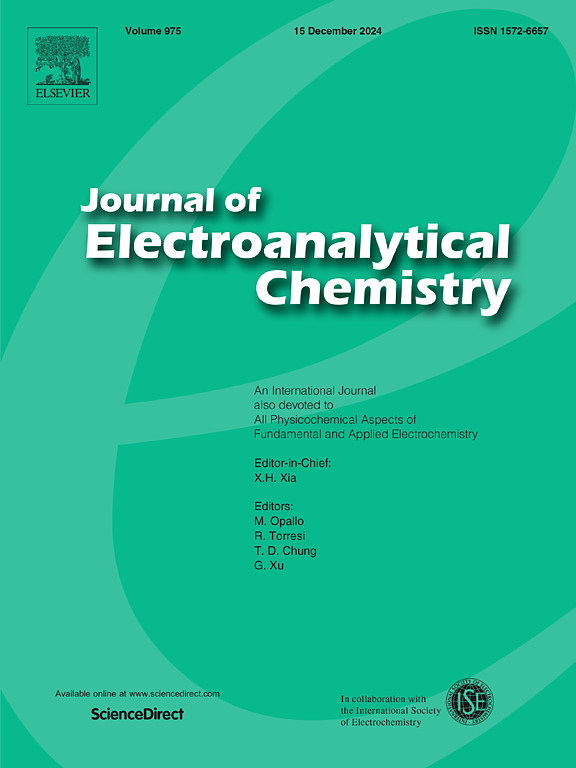Synthesis and electrochemical performance of novel high-entropy spinel oxide (FeCoMgCrLi)3O4
IF 4.1
3区 化学
Q1 CHEMISTRY, ANALYTICAL
引用次数: 0
Abstract
High-entropy oxides (HEOs) are attractive options for anode materials in lithium-ion batteries (LIBs) because of their impressive specific capacity and structural stability. The multi-element composition of HEOs endows them with diverse physicochemical properties. However, the role of different elements in the energy storage mechanism remains unclear, and the limited number of successfully synthesized high-entropy oxide systems currently hinders further development. Therefore, developing HEOs with different compositions and studying their electrochemical properties is of great significance. Using the glycine-nitrate solution combustion synthesis (SCS) method, we produced two new High Entropy Oxides (HEOs), namely (FeCoMgCr)3O4 and (FeCoMgCrLi)3O4, and assessed their electrochemical performance as LIBs anode materials. The studies indicate that the inclusion of lithium significantly enhances the lithium storing capabilities of the material system. Specifically, after undergoing two hundred cycles at a current density of 200 mA/g, (FeCoMgCrLi)3O4 exhibited a specific capacity of 658 mAh/g, which was considerably greater than the specific capacity of (FeCoMgCr)3O4, which was 306.9 mAh/g. This work enriches the spinel-type high-entropy oxide systems and proposes a new design strategy for HEOs as LIBs anode materials.
新型高熵尖晶石氧化物 (FeCoMgCrLi)3O4 的合成与电化学性能
高熵氧化物(HEOs)因其出色的比容量和结构稳定性而成为锂离子电池(LIBs)负极材料的理想选择。高熵氧化物的多元素组成赋予了它们多样化的物理化学特性。然而,不同元素在储能机制中的作用仍不明确,目前成功合成的高熵氧化物系统数量有限,阻碍了进一步的开发。因此,开发不同成分的高熵氧化物并研究其电化学特性具有重要意义。我们采用甘氨酸-硝酸盐溶液燃烧合成(SCS)方法制备了两种新的高熵氧化物,即(FeCoMgCr)3O4 和(FeCoMgCrLi)3O4,并评估了它们作为 LIBs 负极材料的电化学性能。研究表明,锂的加入大大增强了材料体系的锂存储能力。具体而言,在电流密度为 200 mA/g 的条件下循环两百次后,(FeCoMgCrLi)3O4 的比容量为 658 mAh/g,大大高于(FeCoMgCr)3O4 的 306.9 mAh/g。这项研究丰富了尖晶石型高熵氧化物体系,并为 HEOs 作为 LIBs 阳极材料提出了新的设计策略。
本文章由计算机程序翻译,如有差异,请以英文原文为准。
求助全文
约1分钟内获得全文
求助全文
来源期刊
CiteScore
7.80
自引率
6.70%
发文量
912
审稿时长
2.4 months
期刊介绍:
The Journal of Electroanalytical Chemistry is the foremost international journal devoted to the interdisciplinary subject of electrochemistry in all its aspects, theoretical as well as applied.
Electrochemistry is a wide ranging area that is in a state of continuous evolution. Rather than compiling a long list of topics covered by the Journal, the editors would like to draw particular attention to the key issues of novelty, topicality and quality. Papers should present new and interesting electrochemical science in a way that is accessible to the reader. The presentation and discussion should be at a level that is consistent with the international status of the Journal. Reports describing the application of well-established techniques to problems that are essentially technical will not be accepted. Similarly, papers that report observations but fail to provide adequate interpretation will be rejected by the Editors. Papers dealing with technical electrochemistry should be submitted to other specialist journals unless the authors can show that their work provides substantially new insights into electrochemical processes.

 求助内容:
求助内容: 应助结果提醒方式:
应助结果提醒方式:


